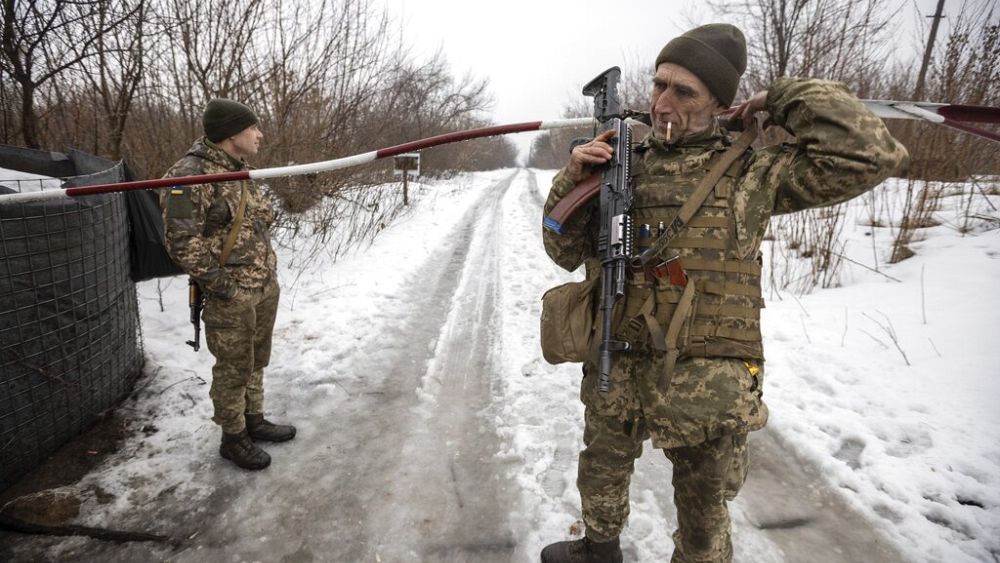
The Ukraine crisis reached a new stage this week when US president Joe Biden approved the deployment of around 3,000 additional troops to Eastern Europe.
The armed forces, which include 1,000 already in Germany, will head to Poland and Romania, according to the Pentagon.
Seeking to reassure eastern European NATO allies, Washington also said it will not deploy troops to Ukraine in an event of a Russian invasion.
The government in Kyiv also pressured the West and especially the EU to show its cards and publish its planned sanctions against Russia.
“I understand that we have to work with a group of partners who need to be convinced to be more active and they have to understand one simple thing: a difficult situation cannot be solved without making difficult decisions,” said Dmytro Kuleba, Ukraine’s foreign minister.
Can Europe survive if Russia stops supplying gas?
In the crosshairs is particularly Germany.
Berlin has refused to deliver defensive weapons to Ukraine, blocked the shipment of certain weapons by allies to the country, and had long shown reluctance to include the Nord Stream 2 gas pipeline under a potential sanctions package should Russia invade.
When asked, in an interview, about accusations that Germany may no longer be a reliable partner, the new chancellor Olaf Scholz said: “Everybody knows exactly that Germany is the country that has provided the largest amount of aid to Ukraine in recent years. Almost €2 billion have been mobilised to stabilise Ukraine`s economic independence and to help it stand on its own two feet and develop well.”
There are worries in Germany and elsewhere that tough sanctions on Russia could have unintended consequences for Europe’s energy security.
A group of researchers at the Brussels-based economic think tank Bruegel warned of a 1970s-style energy crisis — with severe disruptions of Europe’s economic and social life — if Russian gas supplies were interrupted.
“Russia supplies 40% of European gas consumption, and therefore it will be difficult for Europe to cope with that complete interruption of Russian flows that would require a number of different interventions, both on the supply and the demand side and that will come at a high cost for Europe,” Simone Tagliapietra, senior fellow at Bruegel told Euronews.
Controversy as EU labels gas and nuclear as green energy
Brussels also controversially labelled gas and nuclear energy as green, despite a growing backlash.
Ignoring this anger and accusations of greenwashing, the European Commission decided to move forward with its highly controversial plans, hoping the two sectors can help the bloc meet its ambitious roadmap to climate neutrality.
The move has been under discussion for months and has been delayed several times due to deep-seated disagreements between EU countries, which have sent public letters and statements to make their cases. Brussels circulated a draft document on New Year’s Eve, an exceptionally unusual date that reflects the explosive nature of the matter.
As a result, the two sectors will be included in the EU taxonomy, a technical rulebook that allows private and public investors to make informed choices about climate-conscious investments.
The taxonomy covers a long list of projects that make a “substantial contribution” to at least one environmental objective of the EU’s climate policy while avoiding significant harm to any of the other five. The system has already labelled sectors such as solar energy, geothermal, hydrogen, wind power, hydropower and bioenergy as green.
The entrance of gas and nuclear into the taxonomy has raised the alarm among several member states and outraged civil society organisations, which have repeatedly warned the tweak will imperil the ongoing climate transition, undermine the bloc’s international reputation and disregard the Paris Agreement.
Spain has said the plans “make no sense,” while Austria and Luxembourg have invoked the possibility of a legal challenge against Brussels.
In its defence, the Commission stressed that both energy sources will be treated as “transition bridge” and will be subject to “strict conditions”, verification mechanisms and transparency requirements.
“The EU is committed to achieving climate neutrality by 2050 and we need to use all the tools at our disposal to get there,” said Mairead McGuinness, European Commissioner in charge of financial services, who described the latest proposal as a “political agreement.”